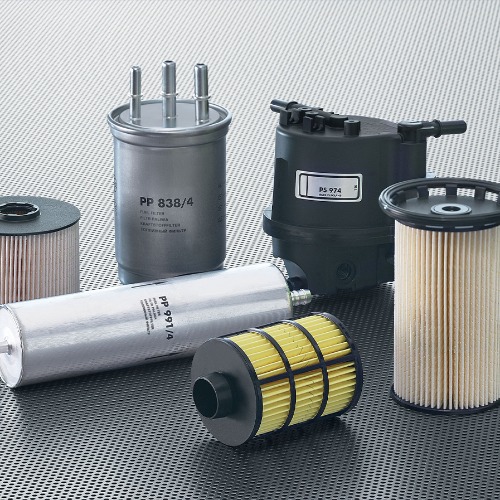Home / News / The Structure of Diesel Filters and The Application of Diesel Filters
Diesel filters, also known as fuel filters, are essential components in diesel engines that help remove contaminants and impurities from the fuel before it reaches the engine. The structure of diesel filters typically includes the following components:
Outer Casing: The outer casing of a diesel filter is usually made of metal or plastic and serves as the protective housing for the internal components. It provides structural support and prevents external elements from entering the filter.
Inlet and Outlet Connections: Diesel filters have inlet and outlet connections that allow the fuel to enter and exit the filter. These connections are typically threaded to ensure a secure and leak-free attachment to the fuel lines.
Filter Media: The filter media is the core component of the diesel filter that performs the actual filtration process. It is a porous material that is designed to trap and remove contaminants from the fuel. Common filter media used in diesel filters include cellulose, synthetic fibers, or a combination of both.
Support Structure: Inside the filter, there is a support structure that holds the filter media in place and maintains its shape and integrity. The support structure is usually made of a rigid material, such as metal or plastic, and is designed to provide structural support to the filter media.
Drain Valve: Some diesel filters may have a drain valve located at the bottom of the filter housing. The drain valve allows for the removal of any accumulated water or sediment that has been captured by the filter. It is typically a small valve that can be opened manually to drain the contaminants from the filter.
Seals and Gaskets: Diesel filters are equipped with seals and gaskets to ensure a tight and secure connection between the filter and the fuel lines. These seals prevent fuel leakage and maintain the integrity of the filtration system.
Pressure Relief Valve: In some diesel filters, a pressure relief valve is incorporated to prevent excessive pressure build-up within the filter. The valve opens to release excess pressure if it exceeds the recommended limit, ensuring the proper flow of fuel through the filter.
Mounting Brackets: Diesel filters often come with mounting brackets or mounting points that allow for easy installation and secure attachment to the engine or other mounting surfaces. These brackets provide stability and support to the filter.
It's important to note that the structure and components of diesel filters can vary depending on the specific model, brand, and application. Some diesel filters may have additional features or components, such as water sensors or heating elements, to further enhance their performance in specific operating conditions. Regular maintenance and replacement of diesel filters are necessary to ensure optimal fuel filtration and protect the engine from contaminants that can cause damage or decrease performance.Besides,here are some of the key applications of diesel filters:
Emission Control: The primary function of diesel filters is to reduce the emissions of harmful pollutants from diesel engines. They trap and remove particulate matter (PM) or soot produced during the combustion process, preventing it from being released into the atmosphere. This helps to comply with emission regulations and improve air quality.
Environmental Compliance: Diesel filters play a crucial role in ensuring compliance with environmental regulations and emission standards set by government authorities. They are widely used in various diesel-powered vehicles, including cars, trucks, buses, construction equipment, and industrial machinery, to meet emission requirements and reduce the environmental impact of diesel exhaust.
Health and Safety: By capturing and reducing particulate matter emissions, diesel filters contribute to improved public health and safety. Diesel exhaust contains harmful substances such as fine particles, hydrocarbons, and toxic gases. The use of diesel filters helps to minimize the release of these pollutants, reducing the risk of respiratory problems and other health issues associated with exposure to diesel emissions.
Maintenance and Engine Performance: Diesel filters also have a significant impact on the maintenance and performance of diesel engines. By trapping soot particles and preventing them from accumulating in the engine and exhaust system, diesel filters help to maintain optimal engine performance, fuel efficiency, and longevity. They reduce the risk of engine damage, improve fuel combustion, and ensure smoother operation.
Retrofitting and Upgrades: Diesel filters are often used as retrofit devices or aftermarket upgrades for older diesel engines that were not originally equipped with emission control systems. Retrofitting diesel filters allows older vehicles and machinery to meet current emission standards, extending their usability and reducing their environmental impact.
Industrial Applications: Diesel filters find applications beyond road vehicles. They are used in a wide range of industrial equipment and power generation systems that rely on diesel engines. These include generators, agricultural machinery, construction machinery, marine vessels, and locomotives. Diesel filters in these applications help to reduce emissions and comply with environmental regulations.
It's important to note that diesel filters require periodic maintenance, such as cleaning or regeneration, to ensure proper functioning. Manufacturers provide specific guidelines for maintenance and replacement intervals to optimize the performance and longevity of diesel filters.





 English
English Español
Español











 ++86 183 3391 1399
++86 183 3391 1399


 +86 183 3391 1399
+86 183 3391 1399
 +86 187 3296 0060
+86 187 3296 0060 Wangshigong Village, Wei County, Xingtai City, Hebei Province, China
Wangshigong Village, Wei County, Xingtai City, Hebei Province, China
